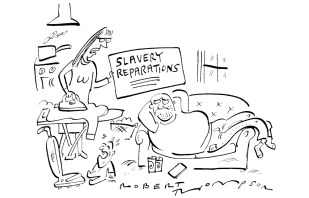I have been trying to interest MPs of all parties in joining my call to persuade Barbados to say ‘thank you’ to Britain for the extra 17 years of life they enjoy as a consequence of their distant ancestors having been forcibly transported, hundreds of years ago, from Africa to the Caribbean. Nobody is quite biting my hand off at the moment, I have to say. They seem to think that the issue is a little ticklish right now.
It would be difficult to make the charge of present culpability stick in any reasonable court of law, surely?
I had mentioned the whole business on last week’s Any Questions? but the audience seemed too appalled even to boo and sat there with their middle-class jaws sagging open, as if they’d just been touched up. I ought to stress I would not be demanding money from the Barbadians – just one of those Hallmark thank-you cards would suffice, plus a promise to stop the relentless grifting and instead to try as best they can to get on with their lives.
Of all the post-rational stuff bought into by the new left, none is more idiotic or corrosive than the slavery-imperialism-racism business. In order to sign up you need to be purblind, utterly ignorant (or maybe just dismissive) of history and logic. And yet so terrified are our politicians of being called racist that they either stay silent or kind of murmur their assent for the whole idea of bunging Barbados a few trillion quid, in addition to the foreign aid the country has received over the years.
It is so easy to refute the notion of reparations that it’s almost not worth the bother – but that’s the hole left open for the lefties and the grifters to crawl through, I suppose. First and obviously, it is not entirely clear as to who should be paying these monies. Is it just the countries who bought the slaves? Does that mean we exculpate those who sold them, such as the various tribes of Ghana and the Bight of Benin? Still more obviously is who in the UK is to blame, if anybody is at all, seeing as everybody involved is dead? At the time this unpleasant practice was taking place, my ancestors were crawling on their stomachs through the pitshafts of the Durham coalfield and were, you might argue, little better off than slaves themselves. They did not benefit – any more than 99 per cent of the country did. I suppose we could trace the lineages of the stinking rich and make them pay up, but it would be difficult to make the charge of present culpability stick in any reasonable court of law, surely?
More pertinent is the question of who the compensation is actually for, and why. Plainly the people who suffered as a consequence of slavery are all dead and therefore would gain nothing from financial redress. Barbados and other Caribbean nations argue, however, that the legacy of slavery still enchains them, although they never actually explain quite how. Perhaps that is because the legacy of slavery has actually benefited them enormously – and this is where the whole argument falls flat on its face.
As I alluded to in that first paragraph, the average life expectancy in Barbados (77.71 years) is more than 17 years longer than that which pertains in Benin (59.9 years), which is one of the principal countries from where slaves were transported. It is also more than 13 years longer than the average life expectancy in the most affluent of the West African nations, Ghana (63.9).
Not only that, but the Barbadians are substantially better off than their, um, donor countries by every conceivable measurement. The gross national income per capita in Benin ($1,400) is approximately 14 times lower than that of Barbados ($19,490), while the figure for Ghana ($2,380) is about one eighth of that which the Barbadians enjoy. It is probably worth pointing out here that the descendants of slaves who now live in the USA enjoy an average income some 40 times greater than that which pertained in the countries from which their ancestors were transported. The same sorts of differentials occur when you look at the comparative Human Development Indices for the countries of the Caribbean and those of West Africa. What exactly are we supposed to be compensating, then – a feeling of pique?
The more frequently deployed argument questions whether it is rational to dredge through the immensely long and incalculably widespread history of slavery and just pluck the UK and the European empires out of the hat and charge them with offences, entirely ignoring the Ottoman Empire as well as all those civilisations which, earlier, imposed slavery upon the British people. This seems especially counter-intuitive when you remember that it was Britain which became one of the first countries to outlaw slavery (Portugal, Haiti and France have similar claims) while the practice continued unabated across bits of the world which we these days call ‘developing’. There is no rationale or logic to this.

But then there is no rationale or logic to any of it. All of sub-Saharan Africa and almost all lefties are united in their belief that imperialism and colonialism are the sole causes of the poverty which exists in Africa today. And yet that canard can be disproved very quickly simply by examining the cases of Ethiopia and Liberia, which share all the same problems as the countries which surround them, including great poverty, but were never themselves colonised. Or compare and contrast with Singapore – a British colony for almost 180 years that now seems to be doing kind of OK for itself.
Indeed there is a good argument to be made, in the case of Africa and the Caribbean, that the later a country gained its independence, the better it is doing today. Compare and contrast Haiti (1820) with St Lucia (1979), for example, or Mauritius (1968) with Liberia (1847). But perhaps we shouldn’t go there. It just makes everybody a little on edge and it doesn’t stop the grifting.








Comments